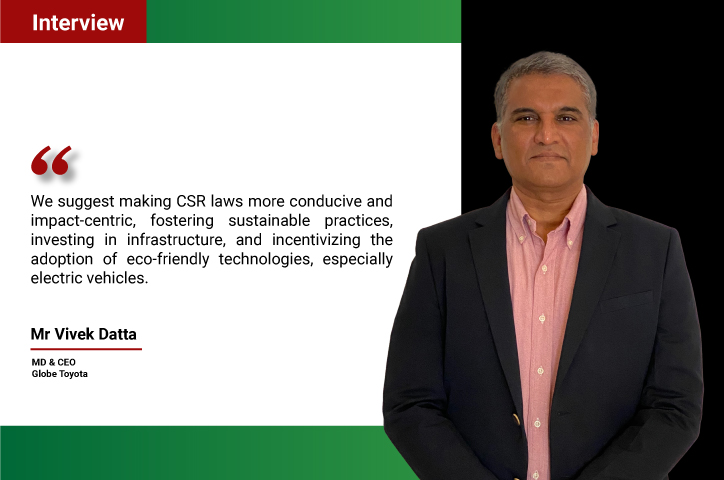Step into the world of automotive innovation and sustainability as we delve into an exclusive interview with Mr.Vivek Datta, the visionary MD & CEO of Globe Toyota. With a steadfast commitment to driving both sustainability and profitability, Mr.Datta is at the helm of a transformative journey within the automotive industry.
In this interview, Mr.Datta unveils the strategic roadmap that intertwines sustainability with success, showcasing initiatives that conserve, recycle, and reuse natural resources while prioritizing the welfare of society.
As we explore the evolving landscape of consumer behavior, Mr.Datta provides unique insights into the burgeoning interest in eco-friendly vehicles. With an eye on the future, he shares Globe Toyota's pivotal role in shaping the automotive industry through the promotion of eco-friendly technologies and the commitment to reduce their carbon footprint by 50% by 2030.
But the conversation doesn't end there. Mr.Datta's vision extends beyond the boardroom as he offers compelling suggestions to policymakers. By advocating for impactful CSR laws and incentivizing the adoption of eco-friendly technologies, he aims to pave the way for a greener, more sustainable future for all.
Scroll down to read the full interview where we uncover the intersection of innovation, sustainability, and success:
Q: Please share an overview of Globe Toyota's CSR philosophy and how it aligns with the company's broader mission and values?
A: As the MD & CEO of Globe Toyota, I am committed to driving our company toward sustainability and profitability. Our CSR philosophy focuses on conserving, recycling, and reusing natural resources, with the welfare of society at large in mind. I am leveraging my background in strategic management and sales to implement sustainable practices and promote eco-friendly vehicles, aligning with the brand's broader mission and values.
Q: Based on your observations, what trends are you noticing in consumer behaviour toward eco-friendly vehicles?
A: We observe growing consumer interest in eco-friendly vehicles, and we ensure the sustainability and long-term impact of our CSR efforts through continuous monitoring and improvement. Green transportation plays a crucial role in shaping the future of the automotive industry, and we contribute to this shift by reducing our carbon footprint and promoting eco-friendly technologies like SHEV (Strong Hybrid Electric Vehicle) by Toyota.
Q: Globe Toyota has pledged to reduce its carbon footprint by 50% by 2030. Could you share some of the strategic approaches being implemented to achieve this ambitious goal?
A: Our ambitious goal is to reduce our carbon footprint by 50% by 2030, and we are implementing strategic approaches such as solar energy consumption, optimization of air conditioning usage, and recycling and reusing water for plant irrigation and vehicle maintenance. We also focus on monitoring natural resource consumption per vehicle and adhering to government norms for waste disposal.
Q: With your rich background in strategic management and sales, how do you leverage this experience to drive Globe Toyota toward its sustainability and profitability goals?
A: We envision becoming the most profitable green eco-friendly dealership group in the region, and we are taking steps toward this vision by adopting sustainable practices and promoting eco-friendly vehicles. Our future sustainability goals include the adoption of renewable energy sources, waste management, and continued focus on reducing our carbon footprint.
Q: You recently launched the "Always Deliver Happiness through Brand Globe" initiative. What are its main objectives?
A: Our "Always Deliver Happiness through Brand Globe" initiative aims to provide excellent customer service, minimize carbon footprint, and contribute significantly to the economic growth of the region. We have faced challenges in implementing our CSR activities, but we have learned valuable lessons and continue to improve our approach.
Q: What are your suggestions to policymakers toward making the CSR laws more conducive and impact-centric so that both companies and implementation agencies can work around it more effectively?
A: To policymakers, we suggest making CSR laws more conducive and impact-centric, fostering sustainable practices, investing in infrastructure, and incentivizing the adoption of eco-friendly technologies, especially electric vehicles. We also advocate for policies that streamline business operations, promote economic growth, and reduce taxes in the automobile sector.


















.jpg)



